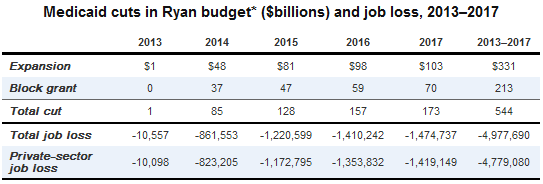West Virginia could lose tens of thousands of jobs over the next five years if Congress enacts the major cuts to Medicaid as proposed by Rep. Paul Ryan and passed by the House of Representatives last month.
According to a
report from the Economic Policy Institute, the $544 billion in Medicaid cuts in the Ryan Budget over the next five years are a real job killer, both nationally and in West Virginia. The EPI estimates that these cuts would cost the economy roughly 862,000 jobs in 2014 and that annual job loss would rise to nearly 1.5 million in 2017, costing the economy nearly 5 million jobs in total.
Source: Economic Policy Institute
Because of Medicaid’s low overhead, the cuts will slow spending on goods and services, such as food, nursing home care and health services, making the these job losses overwhelmingly from the private sector. An estimated 823,000 private-sector jobs would be lost in 2014, and 4.8 million total by 2017.
The cuts to Medicaid would be a job killer in West Virginia as well. According to estimates, the cuts to Medicaid would result in between 28,000 and 42,000 job losses for West Virginia over the next five years.
These job loss estimates are conservative, as EPI explains, “Medicaid is a program generally benefiting low-income households—which, out of necessity, are much more likely to consume rather than save an additional dollar of disposable income—the cuts to Medicaid would likely have an even larger impact on the economy than we estimate here. For example, Reich et al. (2011) suggests a job impact three times greater than what our model assumes. Additionally, it is likely that an even larger share of the job loss would fall on the private sector because overhead includes not only labor but equipment and supplies, which are provided by private companies.”
As we’ve pointed out before, Medicaid is an important program for our state. Approximately twenty-two percent of all West Virginians rely on Medicaid for health care. Cutting Medicaid benefits would hurt many of the state’s poor, elderly and disabled. Medicaid is so important to West Virginia, its people, its economy and its future and reductions at the federal level would do unnecessary harm to some of our most vulnerable residents.
